From SEA: Business Opportunities and Challenges
in ASEAN region in Post-COVID-19
May 27th (Thu) 2021 12:30~14:00 (UTC+7)

Summary
In this session hosted by JETRO, the key topics of discussion were touched upon the expectations to Japanese companies from ASEAN local industries, as well as the business opportunities and challenges for Japanese companies in the ASEAN region.
In the welcome remarks, JETRO's President, Mr. Nobutani Kazushige emphasized that due to the COVID-19 pandemic, the way of doing businesses has been changed significantly with challenging way of lives. However, there are three encouraging moves to change these challenges/adversities into opportunities for businesses in post COVID-19 namely (1) use of digital technology i.e promoting digital transformation businesses with Asian companies; (2) global trend of carbon neutrality and sustainability; and (3) changes in supply chain i.e. promoting Japanese companies’ investment for more sophisticated ASEAN supply chain. These three elements were also included in the ASEAN Comprehensive Recovery Framework adopted by ASEAN leaders last November. Based on such changes, he further stressed that the post COVID-19 economic development would be led by businesspersons and startup entrepreneurs of Japan and ASEAN.
After that, key messages from three business leaders representing Thailand, Malaysia, and the Philippines on changes in ASEAN businesses with the COVID-19 pandemic and the expectations for Japanese companies were delivered.
Mr. Boonsithi Chokwatana, Chairman of Saha Group, expressed his expectations to Japanese companies, such as joint efforts in expanding new businesses into Japan or a third country in post-COVID-19 era by utilizing Thailand's infrastructure and resources as a base.
Tan Sri Dato'Soh Thian Lai, President of the Malaysian Manufacturers' Federation (FMM), expressed his high expectations on the further collaboration between ASEAN-Japan cooperation in the high-value-added and high-tech fields as well as urged Japanese companies/manufacturers to make use of ASEAN Manufacturing Networking Platform through FMM for trade inquiries and business matching requests in Malaysia and ASEAN countries.
Mr. Gerard B. Sanvictores, Chairman of the Philippine-Japan Economic Cooperation Committee (PHILJEC), stated that it is necessary to promote closer cooperation between Japanese and ASEAN industries especially in the fields of services, supporting industries of major infrastructure projects, renewable energy, engineering, software development, as well as human resources development.
In the keynote speech entitled "Economic Development and Transformation in ASEAN Region in the COVID-19 Pandemic", Mr. Taketani Atsushi, President of JETRO Bangkok and Chief Representative for ASEAN, shared the current situation of COVID-19, vaccination progress and trend of economic recovery in the ASEAN region. He further explained that exports particularly from Vietnam and Malaysia turned around due to the recovery of global demand of electronic components and regional trend of expanding the non-manufacturing industries’ investment. In addition, regarding ASEAN Comprehensive Recovery Framework (ACRF) formulated and adopted last year, he pointed out that there are business opportunities for Japanese companies in three strategic areas within the framework, namely (1) maximizing potential of intra ASEAN market and broader economic integration; (2) accelerating inclusive digital transformation; and (3) advancing towards a more sustainable and resilient future. He also introduced various JETRO's support measures to support this endeavor towards this direction.
After that, the directors of JETRO Jakarta, Singapore, and Hanoi discussed on the innovation and sustainability in the ASEAN region in post-COVID-19 era. They introduced the latest local trend with discussion on business opportunities for Japanese companies.
In each country in the region, even though COVID-19 adversely impacted on the economy, the government policies and industrial movement toward the recovery have thrived in post-COVID-19. Taking this opportunity, the speakers then encouraged the Japanese companies to consider the characteristics of each country and actively promote investment in order to seize the new business opportunities in the region.
Giving the specific examples of opportunities in each country, namely Indonesia, the digital startups, EVs and green growth were introduced. While Singapore, the government identified 9 fields including robotics, smart retail, etc. as key areas in driving the post-COVID-19 economic recovery. Focusing on Vietnam, it is an attractive market with abundant IT human resources and high social digital literacy even though the development of start-ups ecosystem is still in progress.
Welcome Remarks
Nobutani Kazushige (President, Japan External Trade Organization (JETRO))
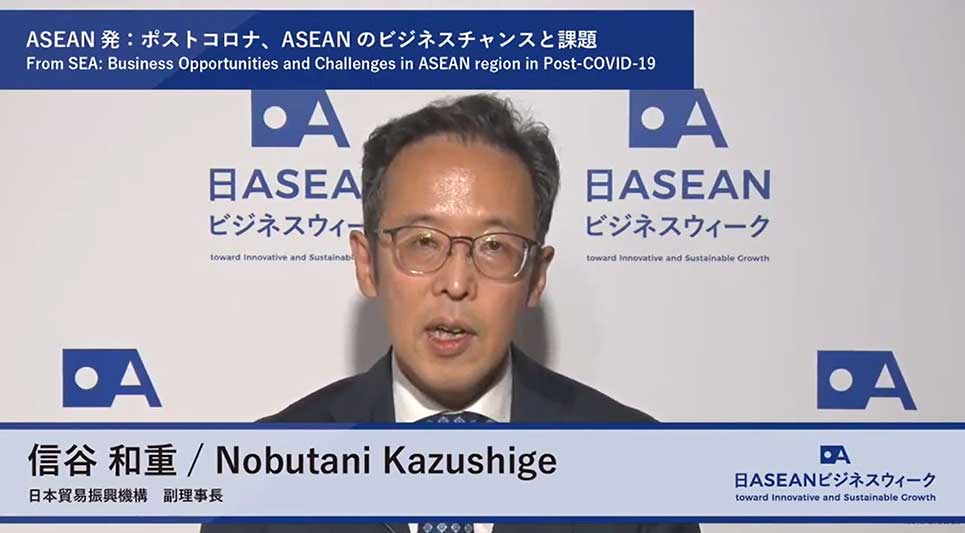
Due to the COVID-19, the way of doing businesses has been changed significantly with challenging way of lives. However, there are encouraging moves to change these challenges/adversities into opportunities for businesses in post COVID-19.
Such encouraging moves included, first the utilization of digital technology. JETRO is focusing on e-commerce to expand markets for Japanese products, as well as promoting digital tranformation businesses with Asian companies to develop economy and build better society.
Secondly, sustainability and green development would be a key element as post COVID-19 business opportunities. Towards the post COVID-19 economy, the world is seeking in aiming to achieve both carbon neutrality and economic development simultaneously.
Thirdly, changes in the supply chain are another important factor in post COVID-19. It is clear that the supply chain of the ASEAN region is the lifeline for Japanese economy. Amid COVID-19, we have also seen supply chain vulnerability stretches across many sectors. Therefore, JETRO is promoting initiatives to support Japanese companies’ investment to strengthen the supply chain resilience in the ASEAN region.
These three elements were also included in the ASEAN Comprehensive Recovery Framework (ACRF) adopted by ASEAN leaders last November. In light of these changes, we expect that business people and start-up entrepreneurs in ASEAN and Japan would play an important role in the post-COVID-19 economic development.
Transforming SEA Business through the COVID-19 pandemic and
Expectations for Japanese Companies
Boonsithi Chokwatana (Chairman, Saha Group)
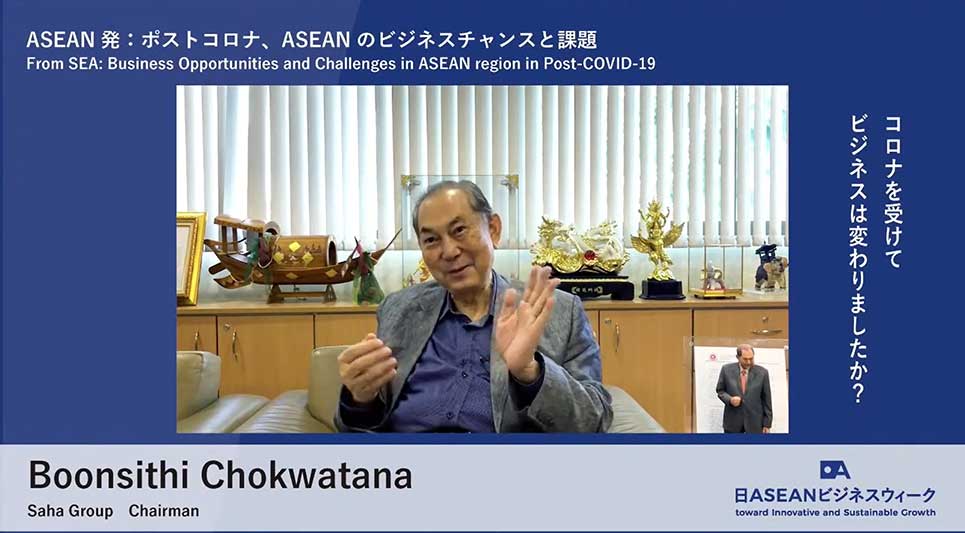
We believe that the form of businesses in the ASEAN region would be changed significantly in the future for instance smartphone based e-commerce businesses which consumers could do for online shopping, e-payment more frequently than ever. In this regard, our group is also focusing on this kind of digital businesses like e-commerce, automation etc. Clearly the business configuration would be changed drastically. In addition, taking into consideration of BCG (Bio, Circular, Green) Concept which have become widespread across Thailand, our company is moving toward this direction as well especially in healthcare and wellness sectors.
These changes would be great opportunities for Japanese companies. It would also be of importance to change the business mindset and use Thailand as a base to expand the businesses as well as to look beyond bilateral partnerships between Thailand and Japan (i.e. third country businesses) for new business opportunities in post COVID-19 era.
Tan Sri Dato' Soh Thian Lai (President, The Federation of Malaysian Manufacturers)
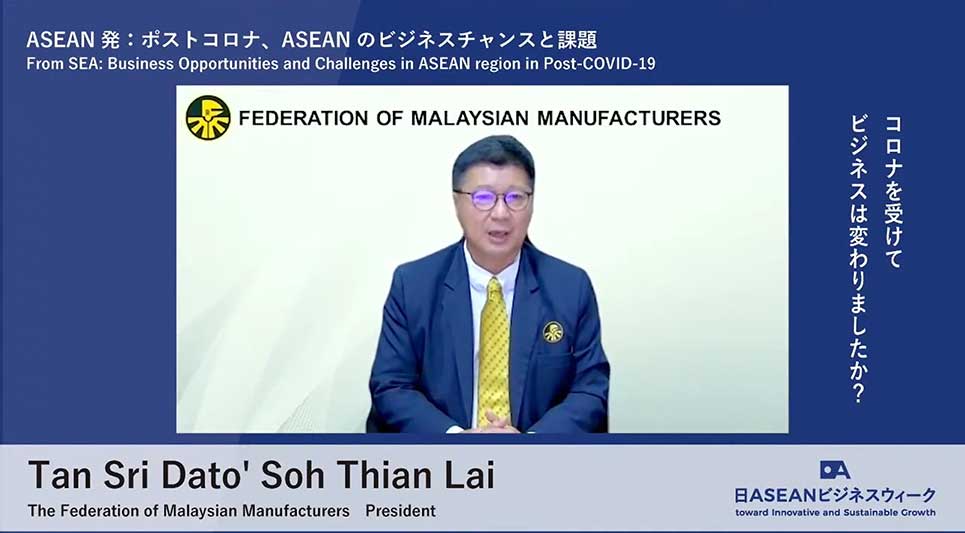
Amid COVID-19, the lockdowns, business closures and production suspensions have disrupted the global manufacturing and supply network. It would be of importance to have concerted engagement in both government and business sectors to be well prepared to face the impacts, to safeguard safety of citizens and to ensure sustainability for business operations.
Referring to the findings of latest FMM-MIER Business Condition Survey, it showed that automation is the most popular technology-related strategy followed by digitalization, and industrial 4.0 in the next few months.
Japan is an important economic partner of Malaysia. Referring to the latest JETRO’s Survey on Business Conditions of Japanese Companies Operating Overseas, it revealed that Japanese companies in Malaysia achieved the fastest recovery in the ASEAN region with 36.1% of Japanese companies intended to expand their business in the next 1-2 years in the region. These findings were also backed by the latest trade statistics in the period of January-March 2021 whereby Malaysia trade with Japan is expanded by 10.6% (USD8.98 billion) compared with the same period in 2020. Based on such figures, I am confident that further collaboration mainly in the high-value-added and high-tech fields, would continue to assist both countries in trade and investment.
As part of efforts to ensure uninterrupted supply of manufactured goods to be made available at national and regional levels, FMM has also taken lead to establish the ASEAN Manufacturing Networking Platform consisting of various manufacturing related organizations in the ASEAN region, and by utilizing this supply chain connection. We hope to support manufacturers to sustain and diversify supply chain connectivity within the region. Japanese manufacturers are also welcomed to approach FMM for trade inquiries, as well as business matching requests in Malaysia and ASEAN countries.
Gerard B. Sanvictores (Chairman, The Philippines-Japan Economic Cooperation Committee)
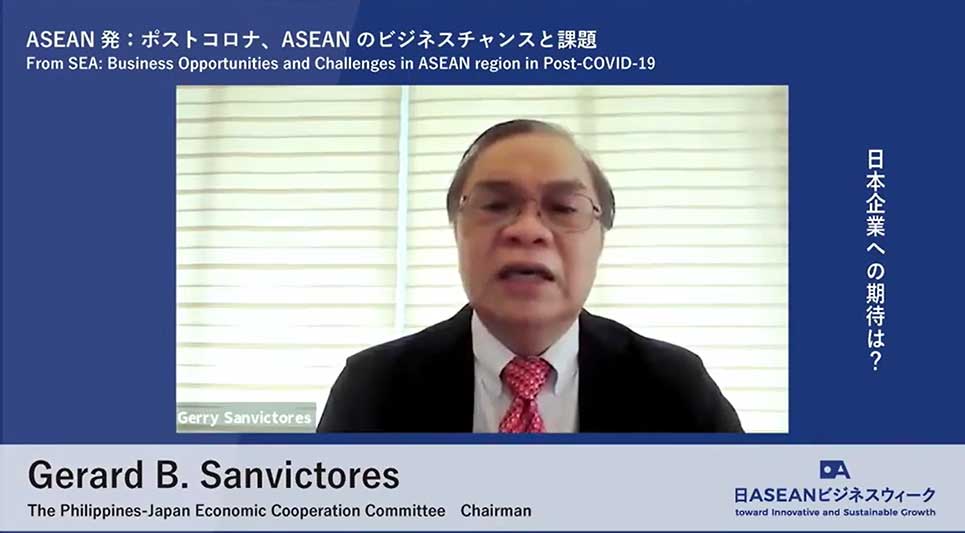
During COVID-19 crisis, it is required many companies to digitize in order to maintain their operations while retail, hospitality and tourism industries were the most severely affected. Many of large enterprises and conglomerates’ performance deteriorated in 2020, with the hope to turn around in 2021 to 2022 as the effects of COVID-19 are controlled.
Japanese companies, especially those in the exported oriented industries were quick to adjust their operations in order to adapt to sudden changes in their environments. Japanese companies in the Philippines also expressed confidence to continue maintaining their business operations in the country. The Japanese Chamber of Commerce and Industry of the Philippines (JCCIPI) representing Japanese business’s interests in Philippines has taken active role in discussion with the government on critical legislations affecting foreign investment both related to physical and non-physical incentives.
It would be of essence to have closer cooperation between Japanese and Philippines industries especially in the cooperative fields of services and supporting industries of major infrastructure projects. Other fields of collaboration are also covered renewable energy, and software development (e.g. Business Process Outsourcing-BPO).
The collaborative efforts between Japanese industries and Philippine academic and research institutions should also be encouraged. It is also crucial to improve the working conditions of the Philippines workers in Japan especially the intern trainee and regular employees in various industries.
Keynote Speech: Economic Development and Transformation
in ASEAN Region in the COVID-19 Pandemic
Taketani Atsushi (President of JETRO Bangkok and Chief Representative for ASEAN)
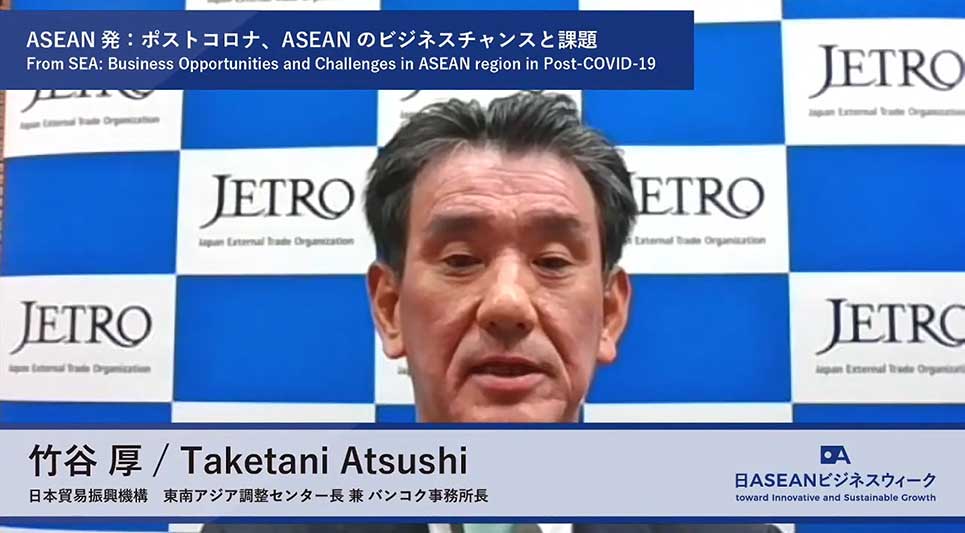
ASEAN as a whole, the region accounts for 3.7% of the global GDP and 8.7% of the world population with expectation to grow in the future, therefore ASEAN is an important region for Japan. Considering these factors, ASEAN is also diverse in term of their stages of economic development.
Focusing on the COVID-19 infection level in the ASEAN region, it has managed the infection level relative well comparing to other regions, though with late spreading emergences in the region such as in Malaysia, Cambodia, Laos, Vietnam, etc. would affect the economic recovery going forward.
Also, the vaccination delay is the biggest concern in the ASEAN region. Singapore and Cambodia seem to achieve the herd immunity by the end of this year whereas Thailand, Malaysia and Vietnam could achieve vaccination rate of 60-70 percent by the latter half of 2022, where first dose vaccination rate is below 10 percent at the moment.
Referring to the IMF’s World Outlook in April this year, its forecast showed the downward revision of economic growth ratio in the ASEAN region due to the delay in vaccination, while the global and U.S. economies were revised upward. According to IMF’s forecast, the ASEAN full-fledge economic recovery is expected in the next year. Referring to the ADB’s economic outlook for each ASEAN Member States, it showed that Vietnam and Singapore have above average growth with upward revision.
In terms of PMI-Purchasing Managers’ Index as an economic indicator showing business confidence, it showed the conspicuous recovery in Vietnam, Indonesia, and Malaysia respectively. On the other hand, Myanmar's economy has been sluggish, with uncertain business environment.
Focusing on business recovery trend, it is also shown in the manufacturing export numbers. We could see a drop in the export data in May 2020 however, the data was gradually recovered, and exceeded pre-COVID-19 level in the beginning of 2021. For instance, Vietnam and Malaysia showed the recovery due to their exports of electronic devices.
From the perspective of Japan, ASEAN is an important investment destination after the US and the EU, along with the expansion of foreign direct investment in the non-manufacturing industries in recent years. Also, Singapore, Thailand, and Indonesia were accounting for 75% of inward investment from Japan within the ASEAN region which is also of importance to closely monitor the development of these three countries.
Focusing on the policy direction in ASEAN, the ASEAN Comprehensive Recovery Framework (ACRF) was adopted by ASEAN leaders in last November with five broad strategies and 3Rs phased approach steps namely Reopening, Recovery, and Resilience. In this respect, Japanese companies are expected to contribute in key areas of strategies namely (1) maximizing potential of intra ASEAN market and broader economic integration, (2) accelerating inclusive digital transformation and (3) advancing towards a more sustainable and resilient future. JETRO therefore would like to contribute to ASEAN in this endeavour toward this direction.
Focusing on the maximization of broader economic integration, JETRO would like to promote the information related to RCEP, the FTA which signed in November 2020 by fifteen countries, including ASEAN, accounting for about 30 percent of the world's total GDP, trade, and population which would be effective for smooth business transaction between ASEAN and Japan. Regarding digital transformation, JETRO would like to urge Japanese companies to participate in the area due to ASEAN’s faster growth. While, concerning the sustainability and green sector, it is of importance for Japanese companies to make use of JETRO network obtaining support such as business advices.
Panel Discussion: New Trends of Innovation and Sustainability in the Post-COVID-19
Era & Direction toward ASEAN-Japan further Collaboration
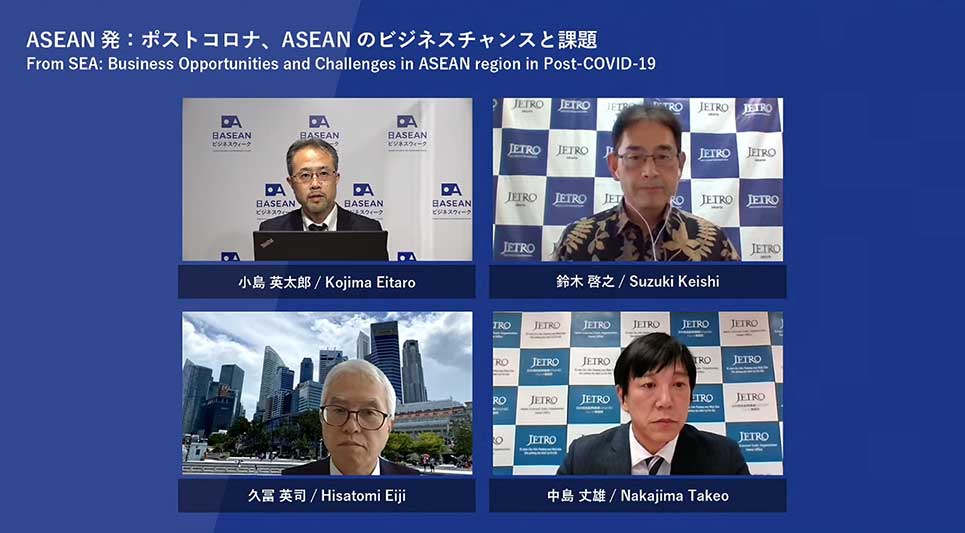
Overview of Local Circumstances
Suzuki Keishi (President Director, JETRO Jakarta)
Indonesia's economy is recovering moderately. Although there is still some wait-and-see mood regarding business expansion over the next 1-2 years, Japanese companies expected the recovery will be driven by domestic demand.
The vaccination rate in Indonesia is the second-highest in ASEAN after Singapore. A voluntary-inoculation program led by local companies is also adapted.
I would like to introduce three business opportunities in Indonesia in the field of start-ups, EV, and green economy.
Thanks to large-scale investment like Bukalapak, in 2020, the total amount of start-ups’ investment in Indonesian is the highest about 70% of ASEAN. In addition, Indonesia has the highest number of unicorns in ASEAN. The internet penetration rate is the basis of their businesses, is still rapidly growing in rural areas. It indicates the existence of business opportunities.
The local government has enforced a presidential decree on promoting EVs with the aim to reduce fuel imports and utilize domestic resources such as nickel. Players from China and the Republic of Korea are very active in vehicle batteries and EV charging stations.
Regarding green and sustainability, the development of solar power plants led by state-owned enterprises and the major coal companies are notable. Japanese companies are expected to play an active role in the future because of their technologies in the fields such as greenhouse gas reduction and waste recycling.
Hisatomi Eiji (Managing Director, JETRO Singapore)
In Singapore, due to the recent spread of infection, partial lockdown measures are being taken, such as ban on dining in restaurants, restrictions on the number of people going outside, promoting teleworking and online school.
Singapore's economy fell sharply in 2020 because of its high dependence on external demand. With the economic recovery of China and the United States, the semiconductors and the pharmaceutical sectors are recovering. However, the tourism and construction industries continue to be sluggish. In addition, the government has tightened foreign working visa policy under the "Singapore Core" concept to prioritize the national employment.
In Singapore, start-ups such as fintech, health tech, and B2B solutions are raising a lot of funds. In addition, the government is focusing on promoting and cultivating Deep Tech such as AI, robotics, and agriculture tech to generate more intellectual property. The major Chinese tech companies are expanding their businesses in Singapore as a bridgehead to enter the ASEAN market and a countermeasure to the US-China trade war.
In May 2021, the Emerging Stronger Taskforce (EST) consists of public and private representatives, announced the strategic economic proposal toward post-COVID-19. The proposal identified 9 areas such as robotics, smart retail, and sustainability as growth drivers of the next-generation economy.
Nakajima Takeo (Chief Representative, JETRO Hanoi)
Although COVID-19 has been well controlled in Vietnam, strict daily living and migration restrictions are applied against the 4th wave of infection. The number of people being quarantined is 30 times as the number of infected people under treatment. Vaccination delayed may take time to obtain herd immunity.
Vietnam economy is driven by electronic components exports to the US and China.
In recent years, the amount of venture capital investment in the country has rapidly grown. Vietnam becomes the third-largest investment destination in ASEAN after Indonesia and Singapore. In 2019, large-scale e-commerce investment projects were notable. The advantages of Vietnamese start-ups are abundant IT human resources with a high social understanding and digital literacy skills. Rapid expansion in the form of importing successful models from developed countries and localizing them is easy to carry out with government support. On the other hand, Vietnam's unique innovations and business models do not yet exist. The ecosystem and advanced technology fields are still under development.
The Vietnamese government has announced greenhouse gas emission reduction by 2030. The government has raised its emission reduction target to 9% by domestic efforts and 27% reduction coordinated with international cooperation. The country's 8th Power Development Plan (PDP8) is currently in the final stage of formulation. However, there are some issues due to insufficient renewable energy generation capacity and transmission & distribution infrastructure, which are also business opportunities for Japanese companies.
1st topic: Latest Local Trend in COVID-19
-
Nakajima Takeo (Hanoi)
-
-
ー
-
Although the COVID-19 has been suppressed, the effects are unavoidable. The Vietnamese economy is highly dependent on the foreign economy to 20% of GDP and 70% of exports coming from external demand.
-
ー
-
Currently, 3-weeks quarantine measures are applied after entering the country, so the movement of people across borders is still stagnant. The government has positioned the COVID-19 countermeasures as a top priority toward economic recovery.
-
-
Suzuki Keishi (Jakarta)
-
-
ー
-
The number of consultations in our Jakarta office last fiscal year is almost the same as usual, and Japanese companies' interest in Indonesia is still maintained.
-
ー
-
As vaccination is progressing, economic activity is expected to become more active. Vehicle sales, PMI, unemployment rate and other indicators such as the number of Japanese expatriates and domestic business trips show the economic recovery momentum.
-
-
Hisatomi Eiji (Singapore)
-
-
ー
-
Singapore is very attractive as a base to fly around the ASEAN region, but there are some points of the restrictions on the movement and the tightened policy of working visas. However, Singapore is efficient country to collect and analyse information on the region to looking for business opportunities. In the future of post-COVID-19, Singapore is still a valuable and important base in the region.
-
2nd topic: Local Business Opportunities & Start-ups’ Trend
-
Suzuki Keishi (Jakarta)
-
-
ー
-
There are many successful players especially Gojek, that is role models to other start-ups. In addition, there are many young people who open minded to the new technology equipment and businesses, that is the foundation of start-up businesses. Besides, the popularity rate of using smartphones is very high that is important factor for digital business.
-
ー
-
Many social issues such as healthcare, education, transportation, and waste, are still required solutions to solve the problems. This also helps to boost the rise of start-ups businesses.
-
ー
-
We believe that, rather than providing some ultra-advanced technologies, we should directly approach young consumers (B2C, electronic payments, healthcare, etc.) that will be a good trend for start-up businesses in the future.
-
ー
-
It seems like Indonesia's Omnibus Law on Job Creation will liberalize the minimum investment amount of 10 billion Rupiah for start-up investment in special economic zones. Such movement should be paid close attention in the future.
-
ー
-
EVs are strongly promoted under the initiative of the government. However, evaluating cost competitiveness is considered from the domestic income and demand. Technology progress in each country should also be taken into consideration.
-
-
Hisatomi Eiji (Singapore)
-
-
ー
-
In Singapore, matching between major Japanese companies and local start-ups has been active. Last year, JETRO supported about 10 companies.
-
ー
-
Recently, social issues in the fields of recycling and energy conservation have been attracting attention. The governments and local companies have high expectations for Japanese companies because of their high technology capabilities and experiences in solving those issues.
-
-
Nakajima Takeo (Hanoi)
-
-
ー
-
In Vietnam, competition is moderate because the number of start-ups is still limited. Investment is concentrated on start-ups in the later stage. There is a tendency of having a more general platform provider which provides multiple services, rather than having start-ups that focus on a specific service.
-
ー
-
On the other hand, no start-up has yet built a business model expanded outside Vietnam. There are a few hardware or deep-tech start-ups. While Vietnam is still facing with many social issues, we expect new start-ups to tackle those problems.
-
ー
-
The influence of Chinese companies is relatively moderate in Vietnam. In addition, there are abundant IT human resources while the country is undergoing a major transformation. It is an attractive investment destination for Japan.
-
ー
-
In terms of sustainability, we believe that Japanese energy-saving technology companies will give advantages in the areas of power transmission, distribution equipment, and smart city development. In addition, the increasing demand for natural gas will be a business opportunity for Japanese LNG-related companies.
-
Closing
-
Suzuki Keishi (Jakarta)
-
-
ー
-
Now, Japanese investment is the most encouraged than ever under Joko’s administration. I think many Japanese companies sometimes might be confused with the local legislation and administration. However, Indonesian government is steadily making efforts for improvement, and now it is our turn to do that. Please be patient to develop this large market from a long-term perspective 5 to 10 years.
-
-
Hisatomi Eiji (Singapore)
-
-
ー
-
We thought that Singapore is friendly country for foreigners and foreign companies, but it is not always. The Singaporean government is balancing "welcoming" and "selecting" depending on the economic situation. It would say "selecting" is being strengthened now under the COVID-19 situation.
-
ー
-
On the other hand, the government provides the great deals of support for business fields in line with national industrial policy, so I think Japanese companies with high technology capabilities should focus more on this fields and appeal the contributions to Singapore's economy.
-
-
Nakajima Takeo (Hanoi)
-
-
ー
-
Digitalization in the ASEAN region is progressing across borders. It will be a great opportunity. Already many business activities have been done online, thanks to digitalization. Due to the limitation of business activities under the COVID-19 situation, we should be good attackers as well as good defenders. The ASEAN region is an exciting place where changes every day, so if you are interested, please visit here after COVID-19.
-
